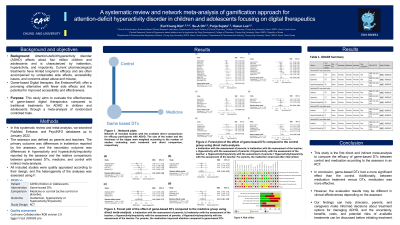Pediatrics
Session: Poster Session C
(225) A systematic review and network meta-analysis of gamification approach for attention-deficit hyperactivity disorder in children and adolescents focusing on digital therapeutics
Wednesday, August 28, 2024
8:00 AM - 1:30 PM CEST
Location: Convention Hall II


Eunyoung Kim, Ph.D (she/her/hers)
Faculty
College of Pharmacy, Chung-Ang University, Republic of Korea- SO
- PS
- HL
Presenting Author(s)
Co-Author(s)
Background: Epidemiological studies suggest that up to 50% of referrals to child mental health clinics are for the diagnosis and management of ADHD.
Objectives: to compare previous treatment to game-based digital therapeutics for ADHD using meta-analysis in RCT
Methods: This systematic review and meta-analysis searched the databases PubMed, Embase, and PsycINFO until January 2022. Raters were defined as parents and teachers. The primary outcome was the difference in rater-reported inattention, and the secondary outcome was the difference in rater-reported hyperactivity and hyperactivity/impulsivity and relative comparisons between game-based DTx, medicine, and control via indirect meta-analysis.
Results: Game-based DTx improved inattention more than the control group as assessed by raters (standardized mean difference (SMD) 0.28, 95% confidence interval (CI) 0.14–0.41, respectively) compared with drug treatment. has also been improved. Teacher ratings showed more inattention than game-based DTx (SMD − 0·62, 95% CI − 1·04 to − 0·20). Game-based DTx improved hyperactivity/impulsivity compared to the control group as assessed by raters (SMD 0.28, 95% CI 0.03–0.53; SMD 0.30, 95% CI 0.05–0.55), and medication improved hyperactivity/impulsivity compared to game-based. The castle has been greatly improved.
Conclusions: Game-based DTx showed a more significant effect than control. Additionally, between medication and DTx, medication was more effective.
Objectives: to compare previous treatment to game-based digital therapeutics for ADHD using meta-analysis in RCT
Methods: This systematic review and meta-analysis searched the databases PubMed, Embase, and PsycINFO until January 2022. Raters were defined as parents and teachers. The primary outcome was the difference in rater-reported inattention, and the secondary outcome was the difference in rater-reported hyperactivity and hyperactivity/impulsivity and relative comparisons between game-based DTx, medicine, and control via indirect meta-analysis.
Results: Game-based DTx improved inattention more than the control group as assessed by raters (standardized mean difference (SMD) 0.28, 95% confidence interval (CI) 0.14–0.41, respectively) compared with drug treatment. has also been improved. Teacher ratings showed more inattention than game-based DTx (SMD − 0·62, 95% CI − 1·04 to − 0·20). Game-based DTx improved hyperactivity/impulsivity compared to the control group as assessed by raters (SMD 0.28, 95% CI 0.03–0.53; SMD 0.30, 95% CI 0.05–0.55), and medication improved hyperactivity/impulsivity compared to game-based. The castle has been greatly improved.
Conclusions: Game-based DTx showed a more significant effect than control. Additionally, between medication and DTx, medication was more effective.
